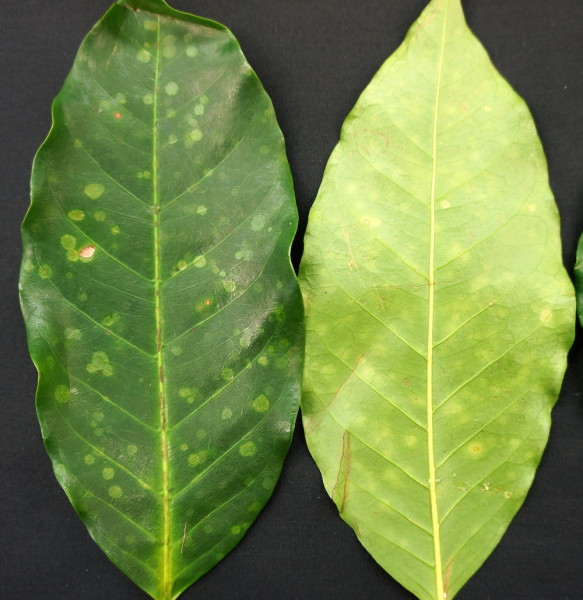
These coffee plant leaves are believed to be affected by an emaravirus characterized by small yellow spots.
Scientists have made a troubling discovery in Hawaii: an emaravirus disease that slowly spreads on coffee plants and results in deformed and undeveloped coffee cherries. Until now, no emaravirus has ever been reported to infect coffee.
The disease was first spotted by a coffee farmer in the Captain Cook area of Kona who noticed small (approximately 5mm) yellow circular legions covering the leaves of plants on two areas of the farm. The farmer contacted Scot Nelson, a plant pathologist with the University of Hawaii College of Tropical Agriculture and Human Resources, and developer of the “Plant Disease” app.
(more: Leaf Rust Fallout: ‘Negative Coping Strategies’ and Food Insecurity)
UH scientists then visited the farm, initially suspecting coffee ringspot virus, but tests proved negative. Scientists noticed virus-like particles that have a double-membrane structures, and the plants tested positive for rare emaraviruses. The emaravirus, believed carried by eriophyid mites that are carried in the wind, is most commonly associated with destroying rowan (a.k.a. mountain ash) trees, as well as fig trees.
“If this virus is the causal agent, it has the potential to move through a field rather quickly,” UH scientists wrote on an informational page set up to promote the discovery. “We doubt the disease will kill any coffee trees, but if it makes the berries unmarketable, the tree essentially becomes an ornamental plant only.”
(more: Materia Gris: How One Honduran Cooperative is Winning the Fight Against Leaf Rust)
The affected coffee plants were destroyed, although scientists also noticed affected plants on a neighboring farm, and the farmer reported that the disease had been spreading slowly among his plants for approximately six years. He described the cherries on the affected plants as resembling raisins, and those cherries were not suitable for harvest.
UH scientists are working with the Hawaii Department of Agriculture to begin surveys, risk assessment and eradication measures. Because so little is known about the disease, they are urging “citizen scientists” to come forward with any information they might have about disease-affected plants. Anyone with information is urged to contact Nelson at [email protected].
(more: USDA to Invest $1 Million in FY13 to Fight Hawaii Coffee Borer Beetles)
Considering the impact of the leaf rust outbreak that continues to affect coffee farms and farmers throughout Central America, as well as the global coffee market, we can only hope this is an isolated event.
Nick Brown
Nick Brown is the editor of Daily Coffee News by Roast Magazine.






Comment